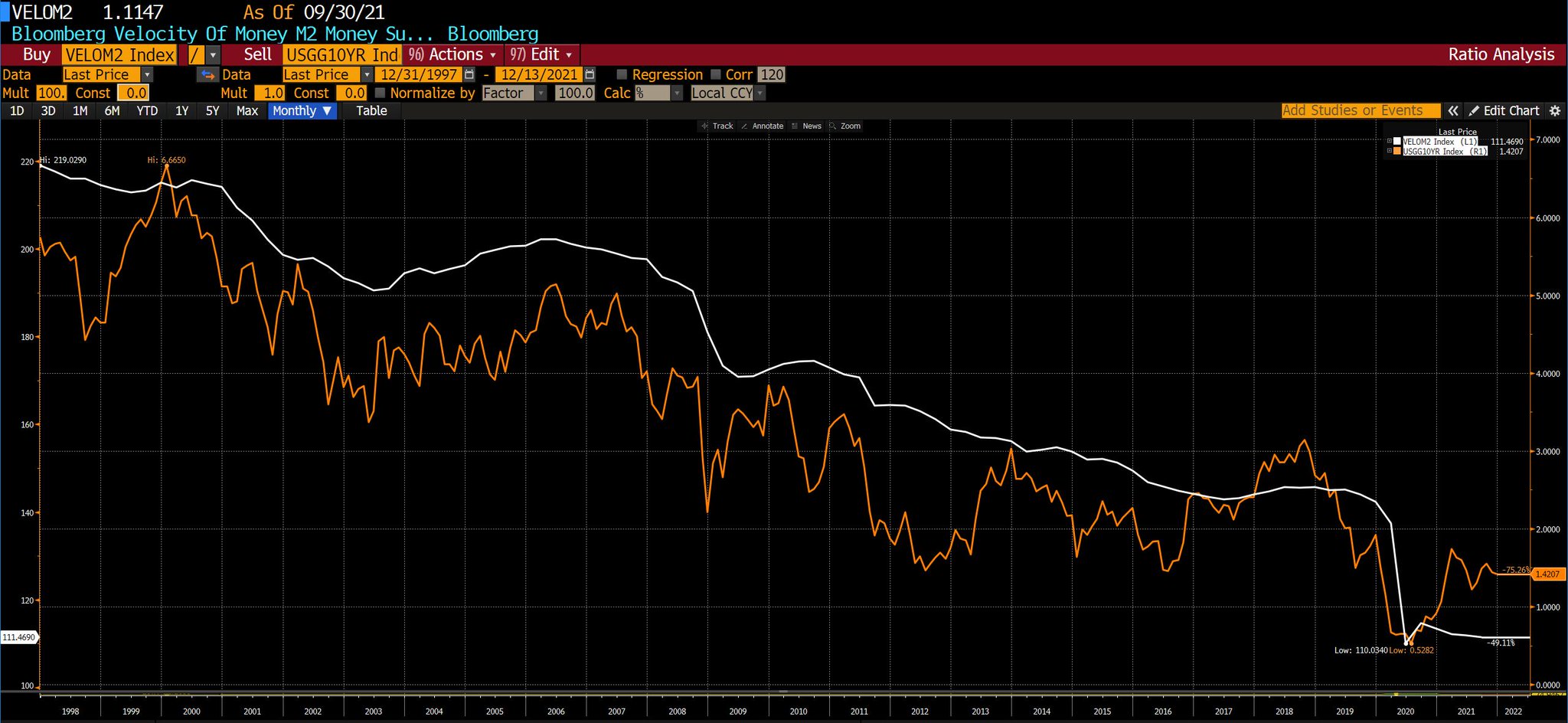As a connoisseur of both sides of the decentralized coin I’ve paid attention to anyone who can make a good argument against crypto. Surface level sophists like Schiff and Krugman (The Internet’s effect on the economy is no greater than the fax machine’s) regurgitate boring talking points, however, there is much better critique out there if you know where to look.
In my opinion nobody has presented a clearer and more convincing bear case for Bitcoin than Mike Green. In this article I’ll summarize Mike’s two arguments against Bitcoin, especially his contention that a deflationary currency is ill suited as a replacement to the dollar.
1) The Dollar as a Force for Good
Today’s zeitgeist is decidedly anti-American. From the left we’re informed that America is a nation of white supremacists and backwards-thinking yokels. The right is more likely to argue that we’ve lost touch with everything that’s made this nation great, and that printing trillions of greenbacks to fund ill-defined “human infrastructure” projects is proof enough that Stalin is knocking at the door.
Zeitgeist aside, Mike argues that under the hood of the narrative we can find serious discrepancy between narrative and fact. Since WWII the world, protected by America’s vast military, has enjoyed a nearly unprecedented level of peace. Skirmishes in the middle east not withstanding, we’ve enjoyed decades of unprecedented cooperation (or if not cooperation, at least not genocide.) Since Bretton Woods, America has enforced peace with an equation that looks (looked) something like this.
- The US Navy patrols the oceans and maintains safe shipping lanes for maritime trade
- In exchange for security, all nations that wish to participate in the global order must use the dollar (and play by America’s rules, more or less)
- In return for following Washington’s lead, nations can ship their goods all over the world (and buy their owns goods/commodities)
We take it for granted that container ships and oil tankers can travel the world at their leisure. However, history suggests that frictionless global trade is an aberration, not a right. It wasn’t always like this, but boy has it been great! Peaceful trade has enabled global prosperity. Increased prosperity has reduced war, famine, genocide and all sorts of other nastiness. When a country’s economic prospects are improving they’re less likely to attack their neighbors and/or revert to authoritarianism. Without a global order secured by the United States, its military and the dollar, how many wars might we have seen? Skirmishes? Genocides? Coups? Terrorist attacks?
Even though the United States has made numerous, highly publicized mistakes, Mike argues that life under the American led order is better than the free for all that has defined much of history. If that’s true then Bitcoin (insofar as it poses a threat to the dollar and the international financial system) is more likely to be deleterious than beneficial.
Love it or hate it, Bitcoin is antagonistic to the dollar. Bitcoiners love to speculate about the day when BTC will replace USD as the world’s reserve currency. Hard money, no more brrr printers, free from government control at last! As utopian as it sounds, Mike argues that you must consider the knock on effects. If the dollar is replaced by Bitcoin, America would likely give up its role as the global policemen. Without a strong military presence global trade and prosperity will decrease. As that happens there will be more conflict and disorder.
Rather than supplanting the dollar with Bitcoin, Mike argues that we should find ways to reform the system. Maintain the good, cast off the bad, and fight for another eight decades of economic growth and relative peace. A cooperating world is possible under an American security umbrella, but unlikely to last long with Bitcoin at the helm of the international monetary order.
2) Deflationary Currencies are Impractical in Practice
 Before we address Mike’s second argument it’s necessary to have a basic understanding of how money is created in our financial system. If you’re not familiar with the money racket you might be surprised to learn that commercial banks create somewhere between 80 and 97% of all the dollars that we know and love. The banks create these dollars out of thin air! Fugazi, fugaehzzi. It’s a woozy, it’s a wazzi. Here’s how it works…
Before we address Mike’s second argument it’s necessary to have a basic understanding of how money is created in our financial system. If you’re not familiar with the money racket you might be surprised to learn that commercial banks create somewhere between 80 and 97% of all the dollars that we know and love. The banks create these dollars out of thin air! Fugazi, fugaehzzi. It’s a woozy, it’s a wazzi. Here’s how it works…
An entrepreneur wants to start a business. He consults with the bank, the bankers like the idea and approve the loan. How does the bank get the money to pay to the entrepreneur? They create it! At their core banks are highly regulated creators of capital. James Bond has a license to kill, banks have a license to create dollars. If you really want to dive into the nuts and bolts you can check out this paper by Richard Werner, however, for our purposes all we really need to know is that,
- Banks create (and destroy) money
- The terms of this system guarantees that the money supply is flexible
Under a fiat standard banks lend when demand is high (and the perceived risk is low). If there is a surge in entrepreneurship, like what we experienced after WWII, banks can create money and lend it to the entrepreneurs. When entrepreneurship is low, or perceived risk is high, banks tend to not lend money (or lend much less than usual). Although this system can create imbalances (2008), it is flexible and can quickly respond to changes in money demand.
The problem with a Bitcoin standard is that it would neutralize flexibility in the banking system. Imagine a pure Bitcoin standard where the only way to get a loan is from a financial institution/investor who wants to lend existing Bitcoins. Well, there is a limited amount of BTC and the demand for loans may well outpace supply. If demand is high and supply is exhausted, rates will quickly rise.
Under these conditions, borrowing money could become so expensive that entrepreneurs can’t afford to take out loans and create businesses (or citizens can’t get mortgages, car loans, students loans, etc.) Restricted by a pure Bitcoin standard it’s likely that the country would suffer* since there wouldn’t be enough capital to grease the gears of the economy. What if Steve Jobs hadn’t been able to get a loan because borrowing BTC was 20% per annum?

$10 bacon, worth it to win a war?
*Or is destroyed! Imagine if government spending is constrained during wartime. While we tend to take a dim view of inflation, if creating money to fund a war is the difference between winning and losing (a justified war with a real threat, I.e. WWII), what citizen wouldn’t trade some $10 bacon to keep their national sovereignty intact?
A hybrid Bitcoin standard could be a more workable solution. In a hybrid system Bitcoin is base money. Just like banks have reserve requirements today, under this new system banks would have to hold some amount of Bitcoin against the loans they make. For example, if the reserve requirement is 20% a bank would need to hold 0.2 BTC for every 1 BTC in loans they issue. Except… Can you see the problem? Banks can’t create new Bitcoin! So whenever they make a new loan they’d need to create some other currency, let’s call it Bitcoin+.
Bitcoin+ solves the flexibility problem, however, at this point we’ve already given up on a “pure” Bitcoin standard. In fact a hybrid Bitcoin system doesn’t even look that much different than the fiat standard we’re already bitching about! So the country goes through all the hassle of adopting Bitcoin, only to create a new system that’s not meaningfully different than the old one. What’s the point?
Everything I’ve just detailed, the impracticality of a hard money standard, is Mike Green’s second argument against Bitcoin. It’s a good one too. Hard money can limit growth in the real economy, much to everyone’s detriment. Another way to think about it is this. George Gammon often talks about the difference between “money” and “wealth.” You can have a lot of money, but if you don’t have anything to buy what’s the point?
Under a pure Bitcoin standards the hodlers might see the value of their coins go up, however, how much benefit would that really provide if there are (a lot) fewer goods and services to spend money on? Who gives a shit about being a trillionaire on a desert island?
Mike Responds
I reached out to Mike on Twitter to see if this article is an accurate representation of his views, and if there were any other details he thought I’d missed. Half an hour later Mike replied with a nice commendation, as well as a simple formula illustrating the pitfalls of Bitcoin’s deflationary monetary policy. Here’s the full message from Mike, I’ve made no edits.
Very well done. You can extend the rates work with the monetarist equation “GDP=MV=PQ” and further extend that to living standards with “per capita GDP = GDP/Population = (MV/Population)=(PQ/Population)” Under a bitcoin system, if population grows, by definition the M is constant/barely growing (21MM/18.7MM)^(1/118)=0.09% per year) so velocity must rise to prevent deflationary conditions. However, it’s much worse than that because it’s actually a function of the population using bitcoin (~100MM) vs the future population using bitcoin (~8B)…
Increasing the PRICE of bitcoin doesn’t solve the problem of bitcoin access for the no-coiners. The only way they can get them is either (1) a bitcoiner spends… and as the price of bitcoin rises they need to spend less and less or (2) they borrow the bitcoin under which condition V must rise sharply and interest rates ~ V. So bitcoin borrowing rates would have to be impossibly high to offset the risk that the project fails and the bitcoin is “lost” (transferred to another with no prospect of return or actually lost).

Tl;Dr
Mike Green makes two key points against Bitcoin.
1) Although the United States is flawed, the dollar hegemony has been a net positive for the world. Yes, the system has been abused and the USA has done some incredibly stupid shit, however, global stability has staved off major wars, genocides and mass immigrations which could have been even more catastrophic than anything we’ve seen in the last 80 years.
2) A deflationary currency like Bitcoin lacks flexibility, which ultimately hurts the real economy and hinders the ability of entrepreneur and businesses to expand. Deflationary currencies may benefit those who own them, but they don’t necessarily benefit society as a whole.
